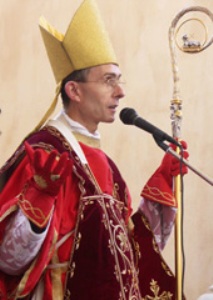
Recently the SSPX Bishop Tissier de Mallerais revealed during a conference a letter written by Benedict XVI which says an agreement between the SSPX is dependant on their acceptance of Vatican II and subsequent Magisterial teaching. I really can't see the problem.
The difficulty is in the "how" the accepting of the Council and subsequent teaching is to be done but I am sure that the good bishop has no problem with Humanae Vitae for example. Bishop Fellay has said that the SSPX accepts 96% of the teaching of VII, but those bishops and priests with whom Pope Benedict might normally concelebrate I suspect would, if they were ever questioned, accept far, far less, not because they really disagree, but because of ignorance or failing to understand what the Church is really saying.
Ultimately, our faith is not about accepting propositions, (though it has been frequently about denying them) except for one: the Church teaches without error. And if you want to know what the Church is: it is simple, it those in communion with Peter and his successors. Though even here, many Catholics, now and in the past, would not be able to voice that belief. It seems as if the real problem with the SSPX is that either it sees the Church as erring, or it doesn't recognise Benedict is Peter. Regrettably there is a sede vacantist streak in the SSPX, it is the fruit of Gallicanism.
It can be dressed up as a dispute over aspects of Vatican II teaching but in its essence it is simply about whether the Church in communion with Benedict is the Church of Jesus Christ or not.
Unless of course one disputes that Vatican II was a valid Oecumenical Council; Orthodox friends certainly would, one of mine dismisses it as a "Western Synod" but that doesn't seem to be a real option for Catholics as it has been continuously defined as an Oecumenical Council by subsequent Popes. Did they err in this? Catholics must answer, "No", or find a new way of defining our Catholic understanding of "Catholic".
However, ever since the Council we have disputed how to interpret it and what it meant and what weight to give its teaching. In that sense it is a singular Council, it itself anathematised no-one if they didn't accept its particular teachings, even if they rejected those central documents labelled "Dogmatic Constitutions". Did the Fathers expect us to treat every word or sentence as de fide, in the same way as we are bound to accept the Canons of Nicea, or even Trent, no-one has ever suggested that, except the maddest diocesan catechist who has never read the documents. On the contrary, Pope Benedict has continuously taught that VII can only be interpreted by previous teaching.






0 comments:
Post a Comment